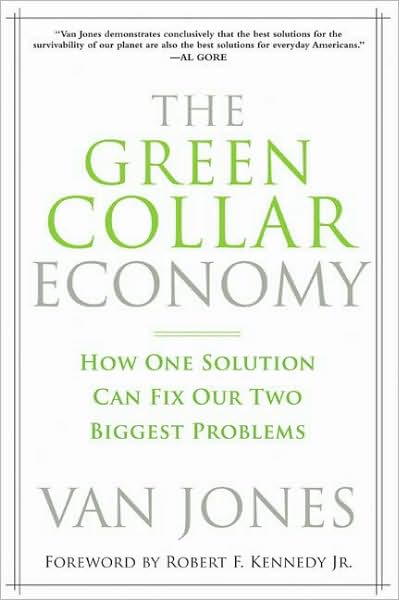
In a recent post ("The Election") we speculated on some investment implications of Obama's victory and noted the conventional wisdom that this was bullish for green tech. In Barnes & Noble yesterday, I leafed through the book pictured above, by Van Jones1. Van Jones sees green tech as a jobs program for blue collar workers, who can be employed building windmills, putting up solar panels, retrofitting buildings, etc.
I'm skeptical of how much of America's energy needs can be filled by solar and wind, but Jones seems to have a handle on the zeitgeist of today's progressives (i.e., liberals). Below is a short video of Jones giving the elevator pitch for his idea.
1Van Jones is an attorney by profession, as is Robert Kennedy Jr., who wrote the forward to Jones's book (Kennedy became an environmentalist after he was busted for heroin possession in the early 1980s, and did community service for Riverkeeper as part of his plea bargain). In fact, most of the blurbs praising Jones's book come from those without science backgrounds. The tendency of environmental advocacy groups to be run by non-scientists was one noted by Michael Crichton in his novel State of Fear.



4 comments:
You don't say much about the substance of his idea. Do you think that a "Green New Deal" is a workable idea? At first glance it seems quite reasonable.
As a temporary fiscal stimulus, I can think of worse things than providing even more incentives for people to winterize their houses, put up solar water heaters, etc. But I don't think you can build a viable economy on policies predicated on getting people to buy more expensive energy. On the contrary, all things being equal, lower energy costs help stimulate economic growth. See, for example, this recent post of mine, "A Tale of Two States: Utah versus Rhode Island". Or think about it intuitively: if you were the CEO of a manufacturing company, for example, would you want to locate it somewhere where there was plentiful cheap energy (whether from nuclear, coal, or whatever), or somewhere where you are forced to pay much higher prices for energy?
The reality is that, even with years of government tax credits -- and a spike in oil prices to $149 per barrel -- there has been limited adoption of 'renewable' energy. The reason is that, in most cases, it's not economically viable yet. Otherwise, everyone would be putting up solar panels and windmills already.
There is no shortage of venture capital money investing in alternative energy, but you can't legislate the pace of technological progress.
Thanks for getting back to me with such thoughtful analysis. I don't think the idea is get people to buy more expensive energy, but rather get enough people using renewable resources that we hit the tipping point where prices finally start coming down.
Peace,
HR
No problem, Hill Rat. Thanks for the comment.
You're right the idea isn't to get people to use more expensive energy, but I think that would be the effect.
Post a Comment